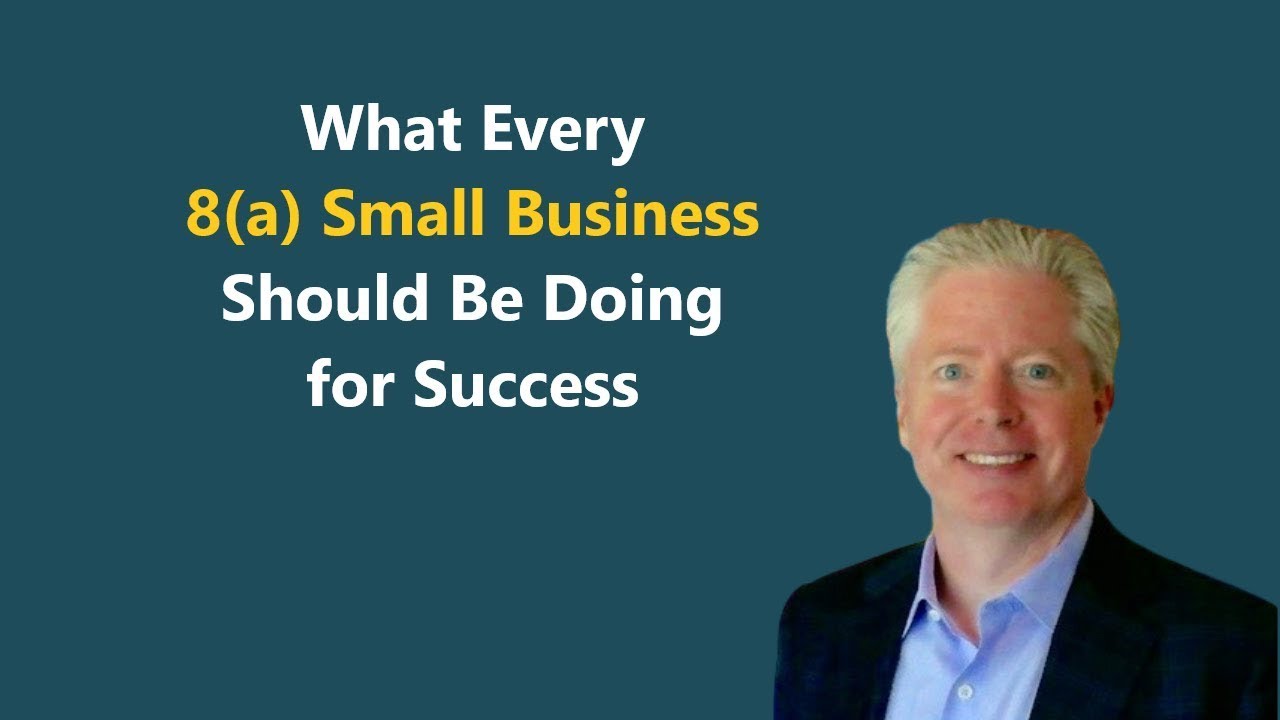In the article “Understanding the 8(a) Certification for Small Business Owners,” Neil McDonnell discusses the essential tasks and strategies for small business owners participating in the SBA’s 8(a) Business Development Program. McDonnell, an expert in federal sales with over 20 years of experience, emphasizes the importance of time management and prioritizing tasks for success. Key tasks highlighted in the video include performing customer work, conducting sales activities, and responding to requests for information (RFIs) and sources sought. The 8(a) certification qualifies businesses for sole-source and competitive set-aside contracts, and McDonnell offers valuable insights and resources for small business owners in the government contracting industry.
As the fiscal year comes to a close and businesses gear up for the next year, Neil McDonnell reminds small business owners to think ahead and build relationships before they’re needed. While September may offer opportunities for end-of-year spending, it’s important to also consider the long-term success of your business. McDonnell shares tips for success, such as doing the right things the right way, establishing a time management matrix, and focusing on the big rocks in your business. With his expertise in federal sales, McDonnell provides valuable training and resources for businesses participating in the 8(a) program and beyond, helping them achieve success in government contracting.

This image is property of i.ytimg.com.
Table of Contents
ToggleOverview of the 8(a) Certification
The 8(a) Certification is a designation for small business owners participating in the Small Business Administration’s (SBA) 8(a) Business Development Program. This program aims to award 5% of federal contracts to small and disadvantaged businesses each year. The certification qualifies businesses as eligible to compete for the program’s sole-source and competitive set-aside contracts. In this comprehensive article, we will discuss the definition, purpose, qualification criteria, benefits, process, tips for success, challenges and limitations, success stories, and common questions related to the 8(a) Certification.
Definition of the 8(a) Certification
The 8(a) Certification is a designation for small business owners who are taking part in the SBA’s 8(a) Business Development Program. This nine-year program aims to promote the growth and development of small and disadvantaged businesses by providing them with government contracting opportunities. The certification allows eligible businesses to compete for sole-source and competitive set-aside contracts, providing them with a competitive advantage in federal contracting.
Purpose of the 8(a) Business Development Program
The purpose of the 8(a) Business Development Program is to assist small and disadvantaged businesses in gaining access to government contracting opportunities. The program offers a wide range of support and assistance to eligible businesses, including access to sole-source contracts, set-aside contracts, business development assistance, mentor-protégé relationships, and eligibility for SBA loan programs. By participating in the 8(a) program, small businesses can improve their competitiveness and growth potential in the federal marketplace.
Qualification Criteria for the 8(a) Certification
To qualify for the 8(a) Certification, businesses must meet certain criteria set by the SBA. These criteria include:
Business Ownership and Control
The business must be at least 51% owned, controlled, and managed by one or more socially and economically disadvantaged individuals. These individuals must also be US citizens.
Disadvantaged Individual Status
To qualify as socially disadvantaged, individuals must have suffered racial or ethnic prejudice or cultural bias, leading to economic disadvantage. Economic disadvantage is assessed based on personal net worth, income, and access to capital.
Business Size and Profitability
The business must meet certain size requirements, depending on the industry. It must have average annual gross receipts for the past three years below the specified thresholds. The business must also show profitability and potential for success.
Good Character Requirement
The owners and key personnel of the business must demonstrate good character and sound financial practices. This includes having a positive credit history and no criminal record.
Potential for Success
The business must demonstrate its potential for success in the federal marketplace. This can be shown through a solid business plan, a well-defined strategy, and relevant experience and capabilities.
Length of Time in Business
The business must have been in operation for at least two years, demonstrating a sustained commitment to its industry and customers.

This image is property of images.unsplash.com.
Benefits of the 8(a) Certification
Obtaining the 8(a) Certification offers several benefits for small businesses. These benefits include:
Access to Sole-Source Contracts
One of the major benefits of the 8(a) Certification is the ability to compete for sole-source contracts. Sole-source contracts are awarded without full and open competition, providing small businesses with a unique opportunity to secure government contracts.
Set-Aside Contracts for Competition
In addition to sole-source contracts, the 8(a) Certification also allows businesses to compete for set-aside contracts. These contracts are specifically reserved for small businesses, increasing their chances of winning contracts in a competitive bidding process.
Business Development Assistance
The 8(a) Business Development Program provides a wide range of assistance to help small businesses grow and develop. This includes training, counseling, and mentoring programs to enhance the capabilities and competitiveness of participating businesses.
Mentor-Protégé Program
The SBA’s Mentor-Protégé Program pairs small businesses with experienced mentors who can provide guidance, support, and business development opportunities. This program facilitates knowledge transfer and fosters mutually beneficial relationships between established companies and small businesses.
Eligibility for SBA Loan Programs
Participating in the 8(a) program also makes businesses eligible for various loan programs offered by the SBA. These loan programs provide access to capital, helping businesses finance their growth and expansion initiatives.
Process of Obtaining the 8(a) Certification
Obtaining the 8(a) Certification involves several steps and requires the submission of a comprehensive application. Here is an overview of the process:
Understanding the Application Process
Before starting the application process, it is crucial to understand the requirements, guidelines, and timelines associated with the 8(a) Certification. This ensures that businesses are prepared and have all the necessary information and documentation to complete the application.
Gathering the Required Documentation
The application for the 8(a) Certification requires the submission of various documents. These may include business financial statements, tax returns, resumes of key personnel, proof of ownership and control, and supporting evidence for disadvantaged individual status.
Completing the 8(a) Application Form
Businesses need to complete the 8(a) application form provided by the SBA. This form collects information about the business, its owners, key personnel, financials, and other relevant details. Accuracy and completeness are essential during this step.
Submitting the Application
Once the application is complete, it must be submitted to the SBA for review. The SBA’s Office of Business Development (OBD) will evaluate the application to determine if the business meets the qualification criteria for the 8(a) Certification.
Waiting for the Certification Decision
After submitting the application, businesses must wait for the SBA to review the application and make a certification decision. The length of time for this process can vary, but it usually takes several months. It is important to be patient and prepared to provide any additional information or clarifications requested by the SBA.

This image is property of images.unsplash.com.
Tips for a Successful 8(a) Certification Journey
Obtaining the 8(a) Certification can be a challenging process. Here are some tips to help businesses navigate the journey successfully:
Research and Understanding of the Program
Before starting the certification process, it is essential to conduct thorough research and gain a comprehensive understanding of the 8(a) program. This includes knowing the eligibility criteria, benefits, and requirements associated with the certification.
Building Relationships with Government Agencies and Prime Contractors
Networking and relationship building are crucial for success in the federal marketplace. Businesses should attend industry events, conferences, and seminars to connect with government agencies, prime contractors, and fellow small business owners. Building relationships can open doors to new opportunities and partnerships.
Maintaining Accurate and Updated Records
Consistently maintaining accurate and up-to-date records is essential. This includes financial records, contracts, certifications, personnel records, and any other relevant business documentation. Keeping organized records facilitates the application process and helps demonstrate compliance and eligibility.
Time Management and Prioritization of Tasks
Managing time effectively and prioritizing tasks is crucial for success in the federal marketplace. Business owners should ensure they allocate enough time and resources to customer work, sales activities, proposal writing, and other critical tasks. Utilizing time management techniques can help maximize productivity and efficiency.
Seeking Professional Assistance
Navigating the 8(a) Certification process can be complex, and seeking professional assistance can be beneficial. Hiring consultants or engaging with organizations that specialize in government contracting can provide valuable guidance, support, and expertise throughout the certification journey.
Challenges and Limitations of the 8(a) Certification
While the 8(a) Certification offers numerous benefits, it also comes with certain challenges and limitations. Here are some to consider:
Limited Duration of the Certification
The 8(a) Certification is valid for a maximum of nine years, with an initial four-year term and a potential five-year extension. Once the certification expires, businesses may no longer participate in the program, limiting their access to sole-source and set-aside contracts.
Intense Competition within the Program
The 8(a) Business Development Program attracts a large number of participants, leading to intense competition for contract opportunities. Businesses must differentiate themselves and demonstrate their unique value proposition to stand out among competitors.
Potential Loss of Sole-Source Contracts
Sole-source contracts, which are a significant benefit of the 8(a) Certification, can be lost if a business fails to meet performance expectations or comply with contractual requirements. It is crucial to maintain high-quality standards and deliver exceptional results to retain these contracts.
Continuous Compliance and Reporting Requirements
Participating in the 8(a) program requires businesses to meet ongoing compliance and reporting requirements. This includes providing the SBA with annual updates, financial statements, tracking subcontracting activity, and complying with various regulations and policies. Businesses must invest time and resources to fulfill these obligations.

This image is property of images.unsplash.com.
Success Stories of Small Businesses with 8(a) Certification
The 8(a) Certification has enabled numerous small businesses to achieve success and growth in the federal marketplace. Here are three case studies highlighting the accomplishments of small businesses with 8(a) Certification:
Case Study 1: Company A’s Growth through 8(a) Contracts
Company A, a small IT consulting firm, obtained the 8(a) Certification and successfully secured multiple sole-source contracts from government agencies. Through these contracts, the company experienced rapid growth, expanded its workforce, and established a strong reputation as a reliable and innovative technology solutions provider.
Case Study 2: Company B’s Access to Government Resources
Company B, a construction company, utilized the 8(a) Certification to gain access to government resources and contracting opportunities. With the support and guidance provided by the SBA’s mentor-protégé program, they formed partnerships with prime contractors, secured set-aside contracts, and significantly increased their revenue and project portfolio.
Case Study 3: Company C’s Mentoring Relationship
Company C, a professional services firm, entered into a mentor-protégé relationship through the 8(a) program with a large prime contractor. This mentorship provided valuable guidance, access to resources, and opportunities for joint ventures and teaming arrangements. Company C experienced accelerated growth, expanded its capabilities, and successfully competed for larger government contracts.
Common Questions and Answers about the 8(a) Certification
Here are some common questions and answers related to the 8(a) Certification:
What is the size limit for the 8(a) Business Development Program?
There is no specific size limit for the 8(a) Business Development Program. However, businesses must meet the size standards established by the SBA for their respective industries.
Can a business be disqualified from the 8(a) Program?
Yes, a business can be disqualified from the 8(a) program if it no longer meets the eligibility criteria, fails to comply with program regulations, or does not demonstrate good character, potential for success, or sound business practices.
How long does the 8(a) Certification process typically take?
The 8(a) Certification process typically takes several months. The exact duration can vary based on the complexity of the application, the volume of applications being processed, and the responsiveness of the applicant in providing requested information.
Can multiple businesses under common ownership apply for 8(a) Certification?
Yes, multiple businesses under common ownership can apply for 8(a) Certification. However, each business must meet the eligibility criteria and undergo a separate certification process.
Conclusion
The 8(a) Certification offers significant advantages for small businesses seeking federal contracting opportunities. By obtaining this certification, businesses can gain access to sole-source and set-aside contracts, receive business development assistance, participate in the mentor-protégé program, and become eligible for SBA loan programs. However, it is important to be aware of the qualification criteria, maintain compliance, and manage the challenges associated with the program. With thorough research, appropriate planning, and a well-executed application process, businesses can benefit from the 8(a) Certification and achieve success in the federal marketplace.





